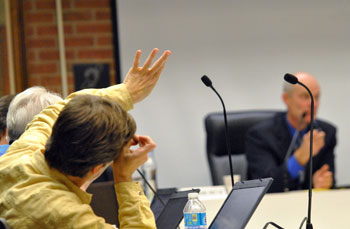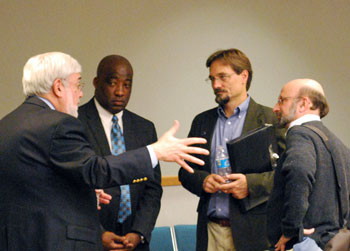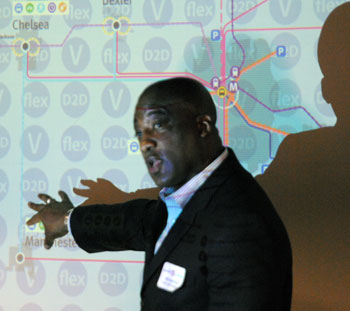Transit Withdrawal Before Council Transition
Ann Arbor city council meeting (Nov. 8, 2012): The post-election meeting of the council – moved from its usual Monday slot to Thursday – featured one high-profile piece of business watched by many throughout the county. That was a vote on withdrawal by the city of Ann Arbor from a new transit authority – called The Washtenaw Ride – which was incorporated on Oct. 3, 2012. The vote to opt out was 10-0. Sandi Smith (Ward 1) was absent.

Margie Teall (Ward 4) raises her hand asking to be recognized so she can speak at the Ann Arbor city council’s Nov. 8 meeting. (Photos by the writer.)
Smith had said her farewell from the council at the previous meeting, on Oct. 15. She had decided not to seek re-election to her seat. At the Nov. 8 meeting, two other councilmembers attended their final meeting – Carsten Hohnke (Ward 5) who, like Smith, did not seek re-election, and Tony Derezinski (Ward 2) who did not prevail in his August Democratic primary. New councilmembers – Sumi Kailasapathy (Ward 1), Sally Petersen (Ward 2) and Chuck Warpehoski (Ward 5) – will be ceremonially sworn in at the start of the council’s next meeting on Nov. 19.
A transitional theme emerged, as discussion of some agenda items straddled the Nov. 8 and Nov. 19 meetings – including the transit authority opt-out vote. Stephen Kunselman (Ward 3) had been planning to bring a similar item forward on Nov. 19, when he felt he’d have a six-vote majority on the question. But that move was preempted by the Nov. 8 item, which included the sponsorship of Sabra Briere (Ward 1), Christopher Taylor (Ward 3) and mayor John Hieftje – who had previously been key figures in supporting the city’s role in the planned authority.
Discussion of a living wage waiver for the nonprofit Community Action Network (CAN) also included mention of the Nov. 19 meeting. That’s when a proposal will be brought forward that would change the living wage ordinance itself. The preference of Hieftje and Hohnke to wait and consider the ordinance revision for all nonprofits – instead of granting a waiver to CAN – was strong enough that they voted against the waiver. But the eight votes it received were enough to ensure that for the next three years, CAN does not need to abide by the living wage ordinance – which would otherwise require it to pay all its workers $13.57/hour.
A resolution that transferred $90,000 from the general fund reserve to the affordable housing trust fund was part of the transitional theme – because it had Sandi Smith’s name attached as a sponsor, even though she could not attend the meeting. The dollar amount was keyed to the price of a strip of land belonging to the former YMCA lot, which the Ann Arbor Transportation Authority recently purchased from the city. The transfer of funds was made in the spirit, if not the letter, of a policy enacted by the council at Smith’s urging at her final council meeting. That policy called for net proceeds of the sale of the Y lot to be deposited in the affordable housing trust fund.
The council’s agenda for Nov. 19 was partially previewed when both Briere and Jane Lumm (Ward 2) announced they’d be bringing forward proposals to revise the city’s Percent for Art ordinance – in the wake of a failed public art millage proposal at the polls on Nov. 6. Briere’s proposal would alter the definition of projects that qualify, while Lumm’s would eliminate the program. The Percent for Art ordinance requires that 1% of the budgets for all capital projects be set aside for public art.
And although he’ll be leaving the council, Derezinski will serve out the remainder of Evan Pratt’s term on the city planning commission. Pratt is leaving that role after being elected Washtenaw County water resources commissioner. At the Nov. 8 meeting, council confirmed Derezinski’s planning commission nomination, which had come at the council’s previous meeting. The council also decided to expand a task force on planning for the North Main corridor to make room for outgoing councilmember Sandi Smith, and appointed her to that group as a citizen member. She’s been serving as the council’s representative.
In other business, a resolution that would have moved toward converting the city’s retirement system to a defined contribution plan – instead of a defined benefit plan – was withdrawn. The council also approved increasing the staffing level of the fire department from 85 to 86 firefighters. And the city’s sign board of appeals (SBA) was dissolved by the council, with responsibilities transferred to the zoning board of appeals (ZBA). The council also voted to give city attorney Stephen Postema a 2.4% raise, his first in five years. [Full Story]





